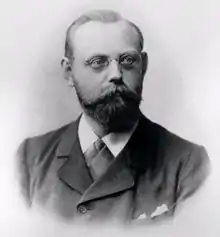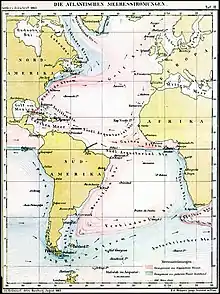
Otto Krümmel (8 July 1854 in Exin, Province of Posen – 12 October 1912 in Cologne) was a German geographer influential in awakening public interest in oceanography.
Biography
He was educated principally at the University of Göttingen, where he was a student of Johann Eduard Wappäus and Karl von Seebach. He approached the subject of geography at first through the study of classics and history. In 1882/83 he was associated with the German Naval Observatory in Hamburg, and in 1883, became an associate professor of geography at the University of Kiel (full professor in 1884, rector 1897/98).[1] In that seaport he found the connection of his subject with marine investigations which directed his subsequent career.

He remained at Kiel until 1911, and during his tenure of it he introduced the science of oceanography to public interest through his handbook Der Ozean (1886),[2] completed Heinrich Georg von Boguslawski's work on oceanography in Friedrich Ratzel's series of geographical handbooks (1887),[3] joined, and published an account of, the “Plankton Expedition” on board the National in the North Atlantic Ocean (1889),[4] served on the International Council for the Study of the Sea (1900-9), and finally produced the great work of his life, the Handbuch der Ozeanographie, in 1907-11.[5]
In 1911, Krümmel quit Kiel to take up the professorship of geography at the University of Marburg as the successor of Theobald Fischer.[1]
Notes
- 1 2 Krümmel, Otto In: Neue Deutsche Biographie (NDB). Band 13, Duncker & Humblot, Berlin 1982, ISBN 3-428-00194-X, S. 109 f.
- ↑ Der ozean : eine einführung in die allgemeine meereskunde HathiTrust Digital Library
- ↑ Nature, Volume 37 edited by Sir Norman Lockyer
- ↑ Die plankton-expedition im sommer 1889. (7. Dezember 1889) HathiTrust Library
- ↑ Otto Krümmel (1907). "Handbuch der Ozeanographie". J. Engelhorn.
{{cite journal}}: Cite journal requires|journal=(help)
References
- Chisholm, Hugh, ed. (1922). . Encyclopædia Britannica (12th ed.). London & New York: The Encyclopædia Britannica Company.
External links
 Works by or about Otto Krümmel at Wikisource
Works by or about Otto Krümmel at Wikisource